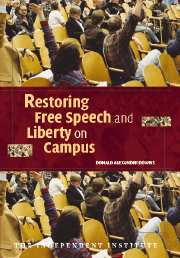Book contents
- Frontmatter
- Contents
- Acknowledgments
- Preface
- PART I INTRODUCTION AND BACKGROUND
- 1 The Return of the Proprietary University: The New Politics of Free Speech and Civil Liberty
- 2 The Rise of Ideologies against Free Speech and Liberty
- PART II CASE STUDIES IN THE POLITICS OF CIVIL LIBERTY ON CAMPUS
- PART III CONCLUSIONS
- Appendix
- Index
1 - The Return of the Proprietary University: The New Politics of Free Speech and Civil Liberty
Published online by Cambridge University Press: 12 July 2009
- Frontmatter
- Contents
- Acknowledgments
- Preface
- PART I INTRODUCTION AND BACKGROUND
- 1 The Return of the Proprietary University: The New Politics of Free Speech and Civil Liberty
- 2 The Rise of Ideologies against Free Speech and Liberty
- PART II CASE STUDIES IN THE POLITICS OF CIVIL LIBERTY ON CAMPUS
- PART III CONCLUSIONS
- Appendix
- Index
Summary
The lore of history has indelibly linked three words in the public's imagination: “free speech” and “Berkeley.” The free speech movement (FSM) at Berkeley witnessed the rise of a mass student mobilization and the first illegal takeover of a campus building – Sproul Hall – in United States history. FSM was the fountainhead of modern student political activism. And at its inception in the 1960s, it was all about free speech – at least in theory.
FSM was originally motivated by the desire to win for students the same rights of free speech and expression that citizens enjoyed in the world outside the realm of academe. This objective later blossomed into a broader movement in American higher education that eliminated or cut back in loco parentis policies, which curtailed student freedoms on the grounds that college students are not yet prepared to assume the full rights and responsibilities of adults. The first major target of student protest at Berkeley was the wall of separation that University of California authorities had erected between politics and the university. In the 1930s University of California president Robert Sproul initiated policies banning such activities as the use of university buildings for holding partisan political exercises. By 1964 students were not permitted to solicit for political purposes or to hand out materials “distributed on University property to urge a specific vote, call for direct social or political action, or to seek to recruit individuals for such action.’
- Type
- Chapter
- Information
- Restoring Free Speech and Liberty on Campus , pp. 3 - 26Publisher: Cambridge University PressPrint publication year: 2004



